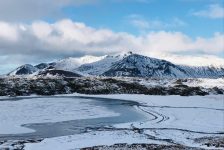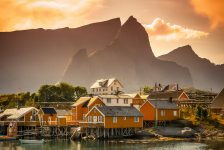Nordic Horizons event, Scottish Parliament, 29th March 2012
From Collapse to Constitution: The Case of Iceland
Lesley Riddoch; Welcomes and intros.
Professor Thorvalder Gylfason, economist, from Reykjavik (Thor)
Christina McKelvie MSP, Convenor of European and External Affairs Committee, hosting. Welcomes everyone. Special welcome to the Ambassador and the consular guests.
Benedict Johnson, Icelandic Ambassador
Lima , Icelandic vice consul
Prof David McCrone EU, Institute of Governance
Prof Elizabeth Meechan – Queen’s University
Lesley – intros Thor. He has put his recent life into drafting a new constitution for Iceland. Constitution is being debated by Icelandic Parliament tonigh.
Prof THORVALDER GYLFASON
Outline of his presentation:
1) Crash
2) Background
3) Process
4) Substance
5) Method
6) Obstacles
- CRASH
When a country crashes the demands focus on investigating the legal structures to understand how this happened. This was the demand of the pots and pans revolution. He draws an analogy with civil aviation. If there’s a crash, there is a full investigation, there is no turning the page until the cause of the crash is understood. This crash was a big one, perhaps the biggest financial crash on record.
- BACKGROUND
There are many new constitutions in Europe. Crisis triggers a demand for a fresh start. Exceptions – Sweden in 1974 and Canada in 1982.
Iceland is an exception. The financial crash of 2008 had deep political roots. This is why the pots and pans revolution after the crash demanded among other things a new, or at least revised constitution.
The key constitutional problem is the absence of effective checks and balances, which allowed the executive branch to grab too much power from the parliament and the courts. Eg 2 ministers enlisted Iceland in ‘coalition of the willing’ to invade Iraq in 2003 – with no consultation with other ministers or parliament.
This supremacy of the executive branch made it easier for the government to ‘jump into bed’ with the bankers. The amount of money in dollars that the banks gave to the government was equivalent to $8 per person in Iceland.
Iceland’s constitution dates to 1944 when Iceland separated from occupied Denmark. It was only ever intended to be provisional.
- PROCESS
Two main reasons for the constitution to be written by the people rather than politicians and their lawyers. The local reason – the long standing failure of the parliament. The universal reason – it is better to involve people; stops political rulers from stuffing it up.
Parliament did three steps. They had an election for 25 seats on the Constitutional Assembly. The candidates saw themselves not as competitors but as advocates. 523 people were nominated, a broad cross section of society.
Second step – selected at random from the national registry 1000 people, gender balanced etc, and they met for a day.
Third step – appoint a constitutional committee to gather info, provide analysis and propose ideas – 7 members from different backgrounds, 700 page report. Very useful.
- SUBSTANCE
People wanted change. The conclusions of the Nat Assembly were cohesive and clear. They wanted strengthening rights to information and they wanted to impose checks on the minister of justice. A broad concensus in favour of significant changes.
The council had 4 months to do its work. Not a problem – the US constitution was written in 4 months in 1787. They decided to re-write it from scratch, they wanted it to prioritise human rights
Agreed a preamble – “we the people of Iceland wish to create a just society with equal opportunities for everyone” – because this has not been happening.
Two key provisions concerning human rights
– Equal voting rights everywhere (one person one vote) – which has not been the case in Iceland up till now – more votes needed to elect an MP for Reykjavik than for a rural area)
-Human rights and natural resources to be balanced (drawing from South American experience)
“Iceland’s natural resources which are not in private ownership are the common and perpetual property of the nation. No one may acquire the attached rights for ownership or permanent use, and they may never be sold or mortgaged”
There is a key distinction between ‘property of the state’ and ‘property of the nation’. The present generation does not have the right to sell off the natural resources/assets which belong to future generations. The use of other peoples’ assets as collateral for finance and banking is unacceptable.
- METHOD
Council decided to invite public to participate. Three overlapping rounds – they posted on the website some new provisional articles for perusal by public. After a couple of weeks they posted revised versions incorporating the changes suggested. In the final round they debated changes to the document article by article.
They got 323 proposals (multiply by 30 to understand the scale of this if it were to happen in Scotland). Over 3600 comments were posted on website by visitors. No invective, very civilised and polite throughout. They did direct webcasts.
They also had expert advice eg from lawyers and others. Everyone had to attend the same meetings; no special meetings for industry or special interest groups (eg fisheries)
- OBSTACLES
Two main obstacles
- the parliament – a new constitution requires consent by simple majorities in two parliaments with an election in between. It must be voted on by midnight tonight – or the timescale for getting a referendum will fail. There is a concern about philibustering.
- powerful special interest groups – vessel owner with lots of public money in their pockets, have strong influence on MPs.
Some MPs have at least 2 reasons for NOT wanting it to go through.
- the equal voting rights will make some of them unelectable. Like asking turkeys to vote on Christmas!
- Natural resources articles – Political suicide to vote against the boat owners – they have undoubtedly funded politicians in much the same way as the bankers did.
The Bill is available in English on the web. No issues have been raised about the technical drafting, internal flaws etc. Any problems with it are political problems.
- CONCLUSION
Similarities with US 1787-88. Drafted in 4 months and put to a referendum 9 months later. It was hotly debated and was voted in by the federalists with the narrowest of margins. But approval by 9 states out of 13 was enough.
A constitution is meant to limit the power of the authorities to damage the interests of the people. He makes the point that not everyone will like this. He expects serious opposition and he welcomes it.
LESLEY – questions
DANIEL JOHNSTON – he notes that the US constitution has remained relatively unaltered and this is unusual. Does Thor think that constitutions need to have maintenance built into them?
CLARE ADAMSON MSP – a lot of the consultation was done on the web – connectivity? How many had access to internet in Iceland?
DREW SCOTT – EC has taken Hungary to compliance re its new constitution?
HUGH KERR – ref national resources – does this include all land etc – this would have implications for Scotland? Eg foreign landowners.
THOR
- we did not build a process for revision because it could be misinterpreted. They debated whether to put in a clause ref national assembly to be elected every 20 years but thought it would be misused
- 95% of Icelanders connected to internet. So what about the 5% not connected? Were they being discriminated against? He doesn’t think so. Their numbers and address were listed and he received letters. But he recognises that it could be a problem in a country with less connectivity (eg Turkey 35%)
- Hungary waited till 2012 to make their constitution – but it has many things wrong with it and he agrees with the EC position. He is pretty sure the EC will find no fault with their constitution.
- National resources – they said that licences to utlise national resources would be subject to ‘full consideration’ and ‘full price’. They debated whether to talk about ‘fair consideration’ and ‘fair price’. They decided not to. There is an article in the constitution on the rights to compensation. If the government confiscates property they must pay full price. So they must be consistent. Farmland is excluded – ie won’t be nationalised. They have no forests!
DAVID McCRONE
Our capacity to deal with complex realities is rather good. We tend not to go in for simplicities but rather for nuances. The constitutional discussion has all sorts of echoes. The creation of the Parliament is a significant event in his life. And involvement in trying to write the rules – and failing, as they were then written by other people.
This experience is part of our cultural history. We shouldn’t reify it, make it a theology – ref to the Constitutional Convention.
The trick about the American constitution is not to freeze frame it but to ride 2 horses at once – have the statement of law but have it malleable. We don’t step in the same water twice – things have moved on from the 90s. But it did open up all kinds of discussions – in a country of 5 million people, not 300000 people. How to do it on that scale?
Heretical thought – constitutions or not having constitutions can be quite useful. This week, there’s another Scotland Bill – how did that happen?! It’s like buses, he says – “Not to be pejorative”. We got the parliament and the power – BECAUSE there wasn’t a British constitution. He looks at Quebec – where the constitutional politics of Canada is a straitjacket for Quebec.
He’s not advocating not having a written constitution – he’s highlighting the pros and cons.
PROF ELIZABETH MEEHAN
Thanks to Thor for inspiring talk about the motives and processes. She wants to address (1) majoritarianism and (2) methods of inclusion.
But first about the crash – ref the announcement of the independence referendum – it struck her at the time that reporting focused on economic cost benefit which seemed a strange thing, rather than ‘to be free’.
She was involved with the NIWC in the run up to the Good Friday agreement – ‘who are these women coming in here with no fixed ideas about the constitution’ from a nationalist politician. Because the NIWC were in it for something different.
With her political science hat on, she refers to the notion of ‘past dependency’ – that the institutions of the past go on affecting the new arrangements. She also notes ref this that eg Alex Salmond having to negotiate his budget with the other parties was perceived as a failure, rather than being seen as a success of the new system.
Majority voting – She is amazed that anyone in the UK thinks its ok if 50% +1 of the population vote for independence and then that’s it. But majoritarianism is the dominant political thinking.
The notion of listing options and voting on them. Leading to her thoughts about inclusion. She is impressed by the Icelandic approach. She is in favour of preferential voting – ref to Peter Emerson who has made this his life work. He did a piece of work in about 1991 in Northern Ireland and worked with them on an options paper for a constitutional referendum.
However we organise the debate in Scotland, it’s important to bring in more than just the Constitutional Convention. Maybe the Internet does provide the opportunity.
One of the organisations that emerged from the Good Friday agreement was the British Irish Council. Jersey is responsible for the digital technology and they did a report that showed huge divisions in access.
LESLEY – QUESTIONS
Should Scotland have a constitution?
GIL PATERSON MSP – a comment in relation to Freedom – freedom is the right to decide. He thinks most people in Scotland would like a constitution. Would it be easier for us in Scotland to develop a constitution since we don’t have one at the moment?
JULIET SWAN ERS – she thinks it’s a bigger picture – a UK constitution is needed/the North East is as entitled as Scotland.
JOHN CLIFFORD – wondering in this really valuable debate that’s going on in this country would there be some mileage in looking at some of the social democracies in Europe?
LIZ BARDELL, works for Rob Gibson and Clare Adamson – if the point of a constitution is to limit authority how effective do we think the ‘malleable situation’ we have here has been in limiting authority.
DANIEL CLINKERSON – the role of the judiciary, as they have remained independent since Act of Union – what should the role of the judiciary be?
Q – What is the provision for amendments?
CLARE SIMPSON – what is the current gender balance of the Icelandic Parliament? And have you built anything in? And what happened to those two ministers?
THOR (responding):
To David McCrone – a constitution needs 2 chief characteristics – to be unambiguous/clear and to be flexible. Oliver Wendell Hobbs – a ‘living constitution’ And houses need to bend in the wind or they will break. The same is true of constitutions. They need to be malleable.
The UK is famous for not having a constitution – it’s about the rules (like cricket). Iceland is not like that. It is not disciplined. And how does he know this? 99.95% is the amount by which the currency has depreciated against the Danish Kroner since 1939 – high inflation is a sign of an undisciplined country.
If Scotland decides to become independent he sees no reason (despite Scotland being very disciplined) why Scotland should not have a constitution. Back to his point about constitutions being there to limit the power of politicians.
LESLEY – is it the case that right at the beginning it was a combination of the pot bashers and the parliament deciding that something different needed to be done?
THOR – some people says it was the pots and pans. But this is not the whole story. The present PM has a proven track record of moving for a new constitution. It would not have happened without the pots and pans though.
LESLEY – but could they have done it without her?
THOR – doesn’t think so.
Gender balance – there is a clear stipulation that the parliament should write into law provisions to ensure gender balance. He doesn’t know exactly the proportion of women in current parliament.
Could Scotland do it? – a resounding yes from Thorvald.
JOAN McALPINE MSP – question re timing. Having a referendum in 2014 and obviously we are confident we will win this – is it appropriate to start discussions about constitution before that happens?
FABIAN GUY – can we think about the process? Not just politicians, maybe a popular assembly?
What is the minimum voting age in Iceland and how far were young people involved?
JOYCE MCMILLAN – as a veteran of the Constitutional Convention process – the critical thing is to have a combo of grassroots impetus with heavyweight support from politicos?? And can we write a constitution? – ‘yes we can’!
MIKE MCKENZIE MSP – concerned that the impetus and framing has come out of traumatic catastrophe – big focus on protecting Iceland from the nasty bankers and nasty politicians. Thinks maybe it could be a more positive experience than that.
MICHAEL HANCE – ref the Irish Times journalist perspective that Elizabeth referenced – he thinks the economic debate is a cipher for something else.
WOMAN FROM GLASGOW – congratulations to Icelandic people for what they’ve done and recognition of the hard time they’ve come through. This needs to be something for everybody to decide, not just politicians and not just civic society – people. And people in Glasgow don’t have internet access.
THOR – Ref the timing – if you want a new constitution and you’re thinking about 2014, you should start now – if you’re pro-independence then you would want a written constitution.
Voting age is 18 – he doesn’t know how many young people participated in the process. But he sensed engagement form young people eg high school kids came to their offices and presented them with a ‘young people’s constitution’.
Traumatic – yes – and this is why they’ve upgraded the human rights chapters heavily, to bring them into line with UN human rights requirements.
They haven’t written into their Bill a precise description of how the constitution can be changed – they’ve said it should take a popular referendum. But they also say 5/6ths of the parliament can make changes – but it can only be used in practice to make practical/technical adjustments.
His last point – the traumatic experience that triggered the whole project had an unexpected consequence – the bill was approved unanimously by the constitutional council – 25 votes to 0.
Suppose a minister or a civil servant goes on a business trip to South America and some people begin to think the trip is inordinately expensive – and a journalist makes some enquiries – the minister can find out who the journalist and makes them unemployable. Because the travel expenses of ministers are private. So this bill is radical. It stops politicians using undue influence and pressure to silence the media and protect their own position.
The concensus was possible because of the common purpose.
LESLEY – think about that computer message ‘restore factory settings’ – it sounds like in Iceland they ‘restored factory settings’.
ELIZABETH – on the role of the constitution – it’s a statement of the kind of society we aspire to be. In 1930s US civil rights, people used the constitution to make the country be what they wanted it to be. Independent judiciary crucial.
DAVID – thanks to Thor and colleagues for coming and making us think about ourselves. We learn from each other but we go our own ways. What bubbles beneath the surface is who owns the constitution? He doesn’t want to reinstate the Scottish Constitutional Convention.
LESLEY – q to David – why not elect? Are we big enough to do that? Would the approach taken in Iceland work here?
MAUREEN WATT MSP – ref to Neil McCormick’s draft constitution, we have a basis, not starting from scratch – Lesley respectfully notes that that’s just one guy
MICHAEL HANCE fears self appointed representatives and likes the idea of the random selection in Iceland.
JAMES CHOLAND (SP) – thinks the Presiding Officer could convene it? [missed this]
LESLEY – why are people frightened of letting the public do this?
CHRISTINA MCKELVIE – concluding remarks – notes that the conversations are already happening – she notes that Thor’s comments about equivocal rights for nature and man could have been written by Burns and that is what she will take away tonight.
THOR – final remarks – we‘re not going back to factory settings, we are retaining our parliamentary structures etc.
If we don’t vote for this constitution tonight, then we are returning to the existing constitution – which includes clauses absolving politicians of responsibility.
He cites the Faros constitution which was a beautiful document but the people of the Faros were never involved – the politicians got in the way. There has never been a referendum on it.
He thinks we should give the public maximum say in the process and ask the politicians to return the power to its source, which is the people.
ENDS 20.45






